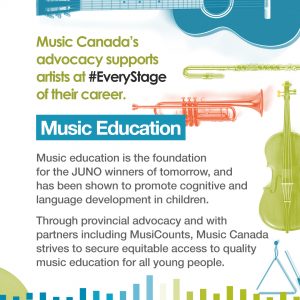Music Canada launches #EveryStage campaign, focusing first on music education
 Music Canada is proud to return as a Platinum Partner of the 47th annual JUNO Awards in 2018, sponsoring both the Album of the Year category as well as the Welcome Reception, which is the official kickoff party to JUNOs weekend happening Friday, March 23rd in Vancouver.
Music Canada is proud to return as a Platinum Partner of the 47th annual JUNO Awards in 2018, sponsoring both the Album of the Year category as well as the Welcome Reception, which is the official kickoff party to JUNOs weekend happening Friday, March 23rd in Vancouver.
Leading up to this year’s annual celebration of Canada’s brightest stars in music, Music Canada will be highlighting the ways in which our advocacy supports Canadian artists at every stage of their career. In the coming weeks, we’ll be publishing a series of blogs detailing our research and advocacy efforts in four defined areas: music education, music cities, copyright, and celebrating success. To kick it off, we’ll start where most Canadians learn the fundamentals with music education.
One of the key recommendations in Music Canada’s Next Big Bang report, which identifies programs and policies designed to stimulate the development of Canada’s commercial music sector and to drive growth and job creation in the economy at large, is to enhance and invest in music education. The recommendation states:
Given the strong evidence that music education prepares workers who are more creative, better problem-solvers, and possess soft skills that are critical in the digital economy, as well as the correlation between music scenes and tech clusters, governments should invest more in music education and should consider music scenes as a tool for economic development.
This recommendation drives much of the advocacy undertaken by Music Canada to secure equitable access to quality music education for all young Canadians.
We are currently working with multiple provincial governments on various initiatives and strategies to meet this goal, and have been a long-time supporter of groups like MusiCounts and their efforts put more instruments into the hands of Canadian kids, as well as the Coalition for Music Education, promoting their efforts to improve the state of music education in Canada.
From a curriculum standpoint, music education falls under the mandate of provincial ministries, but municipalities also have a role to play in ensuring equitable access to music education for all Canadians. And the relationship is reciprocal, as music education also plays a role in the development of vibrant Music Cities.
As our 2015 landmark report, The Mastering of a Music City notes:
Music education is present in successful Music Cities. Generally, it is understood to include formal music training in the education system, as well as specialized programs at colleges and universities. Not only do these programs help develop future musicians, but they develop appreciation for music at a young age, seeding future audiences. The many other benefits of learning and playing music are well documented and wide-ranging. These include enhancing children’s neural activity, language development, test scores, IQ and learning abilities.
One way that municipalities can promote music education is through a phenomenal program that has been popping up in cities across Canada – music instrument lending libraries. Public library branches in Barrie, Kitchener, Vancouver, Calgary, Toronto and other cities now allow Canadians of any age to experiment with and learn new instruments free of charge.
We look forward to sharing more news in the near future on our work to promote and strengthen music education. Next in our series of blogs about how our advocacy supports artists at every stage of their career, we’ll dive deeper into Music Cities and how musicians can benefit from vibrant, actively promoted local music economies.
Music Canada